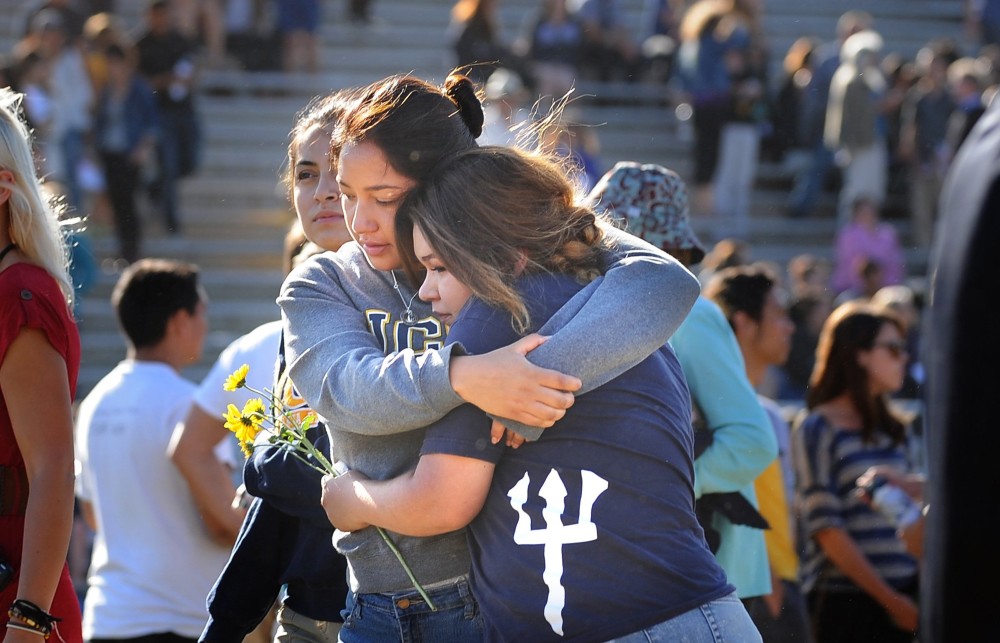By Robin Abcarian
Los Angeles Times.
Last week’s tragedy in Isla Vista, the cold-blooded murder of two women, four men and the maiming of 13 others by a gunman who said he acted out of bitterness caused by years of sexual rejection, has set off a long overdue national discussion about misogyny and presumptions of male privilege.
Without doubt, 22-year-old Elliot Rodger was a sick young man. “I will attack the very girls who represent everything I hate in the female gender,” he vowed in his manifesto/memoir.
And while his rage is extreme, his sense of entitlement toward women, whether real or feigned, is not. It represents a strain of thought that would be familiar to any young man who turned for dating help to the Internet, where professional “pickup artists” purport to teach men seduction techniques based on pseudo-psychology and manipulation. Women are obstacles to be overcome. The goal is always sex.
As happens so often now, social media is driving this important cultural discussion. The Twitter hashtag #YesAllWomen, which sprang up Saturday in response to Rodger’s hateful screed and widely viewed YouTube video, has touched a nerve with women and men alike, moving women to share their experiences of everyday sexism, their despair and their outrage.
#YesAllWomen has become the contemporary version of the 1970s consciousness-raising movement. Maybe it will have some of the same long-lasting results. (It already has some of the backlash; the hashtag #NotAllMen, used to make the rather unnecessary, defensive point that not all men are sexists or rapists, etc., has sprung up in response.)
Today, Facebook announced it had taken down a page extolling Rodger as a “hero” in the “struggle against feminazi ideology.”
But #YesAllWomen is going strong. As recently as Tuesday morning, the topic was still generating passionate tweets:
From the novelist @JoyceCarolOates: “Why does the suggestion that half the human race be treated with respect by the other half arouse such fury in the latter half?”
From @ArielFilion: “‘I have a boyfriend’ is the easiest way to get a man to leave you alone. Because he respects another man more than you.”
From @peeg13: “Because when girls go to college they’re buying pepper spray and rape whistles while guys are buying condoms.”
Though the terrible violence of last weekend is the proximal cause of this outpouring, the cultural moment seems especially ripe for a discussion of how women’s lives fundamentally differ from men’s. One doesn’t have to strain for examples.
Stories of gender inequity and subjugation abound, both at home and abroad.
Six weeks ago, more than 200 Nigerian girls were abducted from their school by Islamic terrorists and are still in peril, despite an international furor. Last week, an official of the Iranian Republic condemned the actress Leila Hatami, a member of the Cannes Film Festival Palme D’Or prize jury, for having the audacity to peck the cheek of the festival’s president on the red carpet, and an Islamist student group demanded she be publicly flogged.
At home, Republican operative Karl Rove suggested that potential Democratic presidential candidate Hillary Clinton had brain damage after she fainted and hit her head last year. Monday, he implied that she is “old and stale.” (If she were elected president in 2016, she would be slightly younger than Ronald Reagan when he first assumed office.)
Earlier this month, the first female editor of the New York Times, reported to have been underpaid compared to her male predecessor, was unceremoniously sacked, according to an online report, because a male underling objected to her plans to hire a new editor, a woman, who would be his masthead equal. (Tell me: In what universe would a male boss be fired because a female subordinate objected to his hiring decision?)
Continuously, the right of American women to control their lives and reproductive fates is under attack in legislatures around the country. In June, we are to learn whether the U.S. Supreme Court will allow private, for-profit employers to deny female employees the health insurance coverage to which they are legally entitled, because the employer objects to the coverage for religious reasons. (Talk about a theocracy.)
On Saturday, as the grotesque dimensions of the Isla Vista tragedy were becoming clear, I happened to hear a story on the KPCC radio show “Offramp” that was unintentionally on point for this discussion.
Reporter John Rabe was checking in, for a third time, with Zoe Tur about her transition from male to female. Tur used to be Bob Tur, known to many Angelenos as the veteran news helicopter pilot who recorded the attack on truck driver Reginald Denny that marked the beginning of the 1992 Los Angeles riots and in June 1994 followed O.J. Simpson’s white Bronco during the infamous slow-speed freeway chase.
I was pleasantly surprised to hear how happy Tur sounded and by how forthrightly she discussed the issues around her transition. But she said something that astonished me as well.
In discussing her fears about the future, she said that her upcoming genital surgery, a final step in her physical transition, was not one of them.
“What scares me more,” she said, “is really the loss of the male privilege.”
She didn’t elaborate. She didn’t have to. Welcome to our world, Zoe.
___
ABOUT THE WRITER
Robin Abcarian is a columnist for the Los Angeles Times.
___














































































































































































































































































































































































